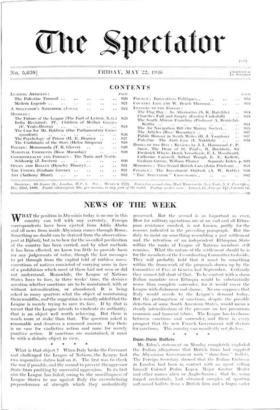What is that object ? When Italy broke the Covenant
and challenged the League of Nations, the League had two imperative duties laid on it. The first was to check the war if possible, and the second to prevent the aggressor State from profiting by successful aggression. In its first aim the League has failed, owing to the unwillingness of League States to use against Italy the overwhelming preponderance of strength which they undoubtedly possessed. But the second is as important as ever. How far military operations are at an end and all Et Itio- pian resistance crushed, is not known, partly for the reasons indicated in the preceding paragraph. But the duty to insist on something resembling a just settlement and the retention of an independent Ethiopian State within the ranks of League of Nations members still remains. What the nature of the sct t lenient should be is for the members of the Co-ordinatilig Committee to decide. They will probably hold that it must be something within the framework of the proposals drawn up by the Committee of Five at Geneva last September. Certainly they cannot fall short of that. To be content with a sham Italian mandate over Ethiopia would be substantially worse than complete surrender, for it would cover the League with dishonour and shame. No one supposes that Italy would accede to the Leat,rue's demand today. But the prolongation of sanctions, despite the possible defection of some South American States, would mean a steady intensification of the pressure on her precarious economic and financial fabric. The League has to choose between sanctions and surrender, and there is every prospect that the new French Government will declare for sanctions. This count ry can manifestly not do less.


















































